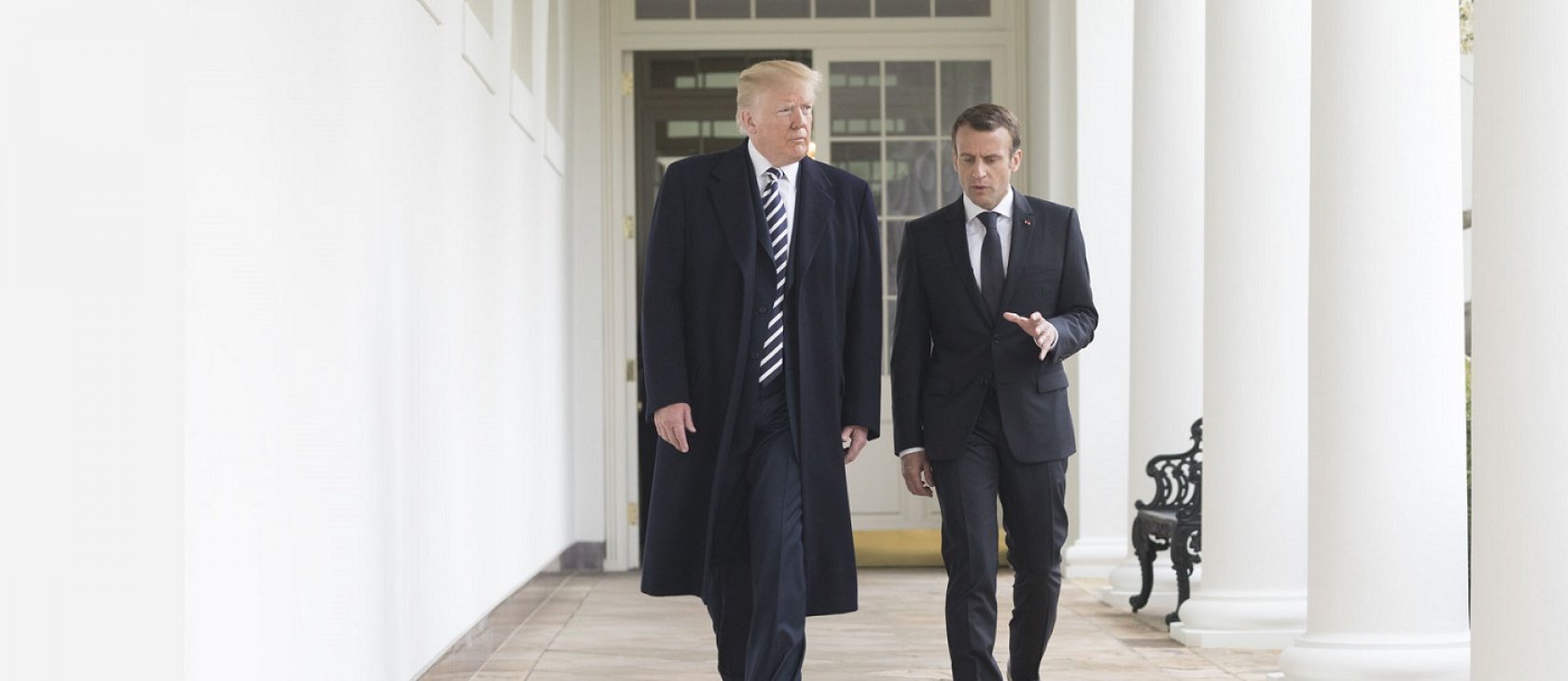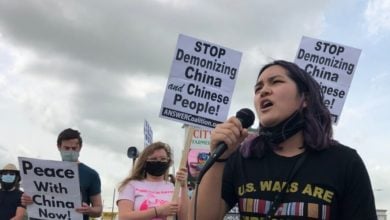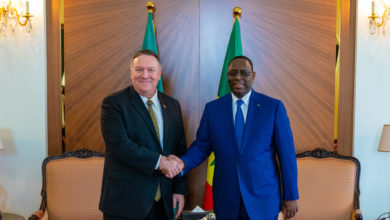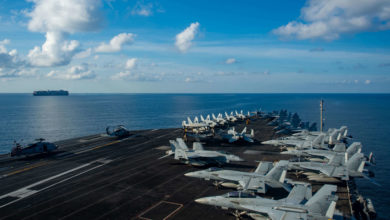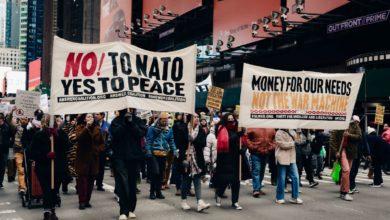Armistice Day commemorations were marred by sharp disagreements between U.S. and West European political leaders about the exact nature of their “partnership”. As people mourned the one hundredth anniversary of the end to World War I, French President Emmanuel Macron earned the ire of Trump by saying a European army needed to be developed. His rationale is that a European army is needed to counter the “threats” of Russia and China and that Europe relies too much on the U.S. military.
Other European leaders have expressed differing levels agreement with Macron’s sentiments. German President Angela Merkel endorsed the comments while Eastern European governments which have traditionally been more closely tied to Washington have been reticent to endanger the relationship with their trans-Atlantic master.
There are several lessons to be learned from this episode. The most obvious is the extreme callousness with which capitalist politicians view the lives of their citizens. Macron made his remarks about the need to rearm Europe on an occasion when people the world over were remembering the slaughter of 11 million people, all so that capitalist politicians could re-divide a world that had already been divided by imperialist powers. The call to create a new army to “protect” Europe belies Macron and Merkel’s supposed devotion to peace.
U.S. corporate media has reported these developments in a confused way, obfuscating the dynamics between European capitalists, their political representatives and the U.S. state. So what does Macron really stand for and why is he opposed to Trump’s political agenda? Before moving to the particularities of French politics, it’s necessary to have a clear view of the European Union.
What is the “European Union”?
As Liberation News has noted, the “European project” has always been at its core a strategy for capitalists to bolster their own standing in the world and ability to undermine the social programs and other protections the workers’ movement has won. The free movement of capital within the economic and monetary union has allowed for trade unions to be smashed, production to be shipped abroad to low wage countries, and the wealth of capitalists to go untaxed by funneling assets into opaque shadow banking and accounting networks in the City of London.
The rhetoric coming from the centers of power concerning this issue has been disorienting. Pro-EU capitalist politicians structure the debate as one between “nationalism and multilateralism.” They claim that defending the neoliberal status quo means defending an open society. Thus, in this view, those who support the rights of migrants and refugees should support the EU.
The relatively small section of the European ruling class that is opposed to the EU have seized upon some workers’ very legitimate skepticism of the neoliberal European order to push a racist agenda, demonizing those who come to Europe to flee wars started by the United States in the Middle East and North Africa. This demonization is another tool in the bloody toolbox of the capitalist state: turning on migrants and refugees shatters the solidarity of our class. Creating a racist scapegoat allows for the system to direct popular anger against “foreigners” –the formerly colonized peoples–rather than against the real enemy of European workers, the European capitalist bosses.
Political differences in elite French politics
With this background in mind we can see the rifts within the ruling class and two trends developing. To deal with the crisis of capitalism, neoliberal sectors of the French capitalist class have coalesced around Macron’s new political party, “On the Move.” Like the Democrats and Republicans in the U.S., this is not a political party per se so much as a political affinity group. There are many different views expressed in this bloc but chief among them is the commitment to maintaining the EU.
Given the historical legacy of post-war French politics, Macron walks a fine line between a putative commitment to French sovereignty and his very real commitment to the technocratic, unaccountable rule of Brussels. He has styled himself a patriot while selling out the workers of France to international capital. Acting as a strikebreaker and bringer of austerity, Macron has dramatically shrunk the public sphere and sought to destroy what is left of the heroic legacy of French “syndicalisme radical.” Massive strikes by rail workers earlier this year expressed popular disgust with the privatization of public service, In many ways, Macron has been more “Gaulliste” than Les Républicains, initiating constitutional reforms that would consolidate an even greater amount of power in his person.
The other capitalist political trend arising out of the crisis in Europe is the insurgent far right. Marine Le Pen’s National Rally (RN), formerly the National Front, has been the main beneficiary of this rightward shift in politics. The scion of a father who denies the Holocaust and tortured FLN fighters in Algeria, Le Pen has sought to maintain the imprimatur of the far right while bringing her odious ideas into the mainstream. The RN panders to a far right base rooted in deep-seated French anti-Semitism and anti-Arab racism while broadening her message to try to take advantage of bona fide dissatisfaction with the EU.
Opportunistically twisting political grievances to serve a racist agenda is a core feature of fascism. The only antidote to this blight is revolutionary socialism.
Europe and the United States
Key to understanding the trajectory of these two trends is their relationship to U.S. Empire. Macron represents a sector of the capitalist class that is scared of the potentially destabilizing effects of Trump’s policies and chauvinistic attitude towards the “junior partners” of U.S. imperialism.
This is not only embarrassing for politicians who have to explain their servility to U.S. interests to their people but also stands to be economically harmful to some European capitalists. Since taking office, the Trump administration has made extensive use of tariffs to bolster U.S. businesses at the expense of their international competitors. Many establishment thinkers believe this policy creates more problems than it solves, increasing military overextension and alienating potential partners. Among this camp would be included Macron, Merkel, and Obama, whom Macron admires.
Sensing intransigence from a United States committed to redefining the “rules-based international order” in its own favor, these European leaders are increasingly seeing their fate as being separate from that of the United States. Since the Suez crisis of 1956, European powers have played a junior role in the management of world imperialism, subordinate to the leadership of the United States when it comes to issues of central geopolitical importance. The primacy of the U.S. ruling class in the imperialist club is based in large part on the enormous size and capacity of its armed forces. So why create a new pan-European army?
One aspect of this rationale is the increasing erraticism of U.S. policy makers. Another factor potentially influencing Macron’s decision to consider the creation of a European army is the fact that there are serious questions being raised about the efficacy of the U.S. military in a conventional war. With “great power conflict” being the focus of the new National Defense Strategy, neoliberal European leaders might be calculating that the U.S. emperor has no clothes.
Whatever the future may bring it is clear that the creation of a European army would signal the beginning of a breakdown in the system of alliances that has served European and U.S. capitalists well since WWII. It is up to the workers of all countries to stand together against militarism and empire!


